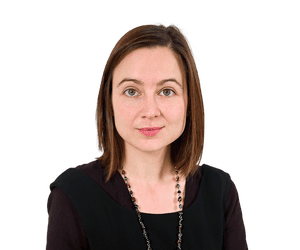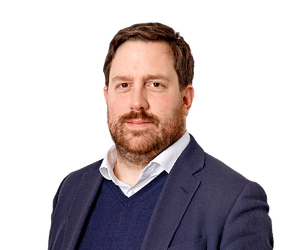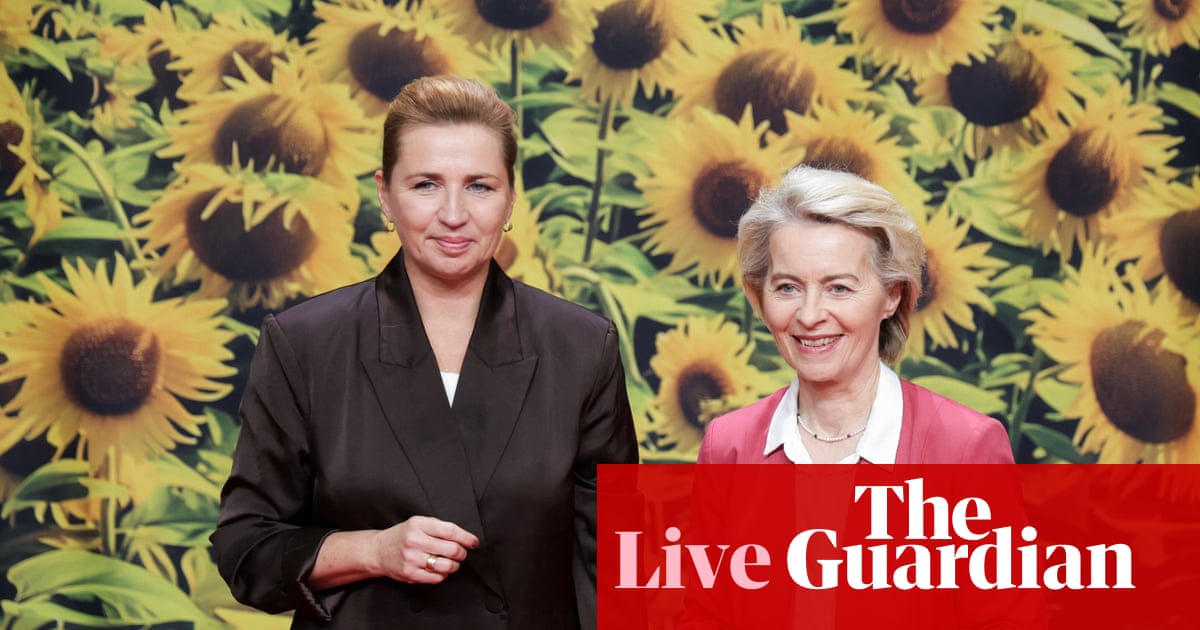Danish prime minister Mette Frederiksen is now opening the formal proceedings.
Flanked by the European Council president, António Costa, and Ukraine’s president, Volodymyr Zelenskyy, she says:
“For the last few months, there has been much talk about peace in Ukraine, with meetings, pre-meetings and briefings about the meetings, and meanwhile, Russia continues its brutal attacks.
It must be clear to everyone now: Russia will not stop until they are forced to do so.”
She adds that “we have one major task ahead of us: we have to make our common Europe so strong that war against us becomes unthinkable, and we have to do it now.”
Key events
Please turn on JavaScript to use this feature
Belgian PM repeats legal questions about using frozen Russian assets to fund Ukraine
Last night’s discussions on Russia and Ukraine largely focused on the question of using frozen Russian assets to finance loans to Ukraine.
But Belgium’s prime minister Bart de Wever is leading a group of countries that remain sceptical about the move as they are concerned about legal consequences.
Belgium is particularly exposed here, as more than a half of the funds are held at a Brussels-based clearing firm, Euroclear.
In his comments this morning, he said he had asked other leaders to give strong guarantees they would share the risks if frozen Russian assets were used to finance loans to Ukraine.
He suggested that Belgium would be ready to go forward with the plan only if its questions get answered satisfactorily, and that’s not the case so far.
Share‘Why are we afraid’ of Russia, Hungary’s Orbán asks, as he insists EU is ‘stronger than they are’
Ohh, that’s interesting.
As Poland’s Donald Tusk was chatting with a group of Polish journalists, one of them decided to shout a question in English to Hungary’s Viktor Orbán, who was talking to some Hungarian reporters nearby.
With a bit of encouragement from Tusk, Orbán walked across to the Polish group, where he was challenged with a simple question:
Who [poses] the main threat for Europe?
(Tusk quickly realised what’s going on, warning him: “It’s a provocation.”)
But Orbán kept his cool and replied:
– The real danger? Economic stagnation and losing competitiveness.
– Not Russia?
– We are stronger than Russia. Make some comparisons and base your opinion on the facts. We have more than 400 million people, Russia is 130 something. Look at the European GDP is [big] like that. Russia is [small] like that. We spend all together, the 27, more on military spending than the Russians. So why we are afraid? We are stronger than they are.
The question is whether we have, whether we have leadership to come together and to defend our interests together. That’s what we should do anyway.
Share‘Degree of naivety’ in Ireland over ‘existential’ Russia threat, Irish PM warns
Irish prime minister Micheál Martin focused on the security situation facing Europe in his comments, as he talked about “a pattern” of Russian behaviour in eastern Europe and warned about a “degree of naivety back in Ireland in respect of that.”
He said:
“We had a very serious discussion in terms of the threat that Russia is now posing to the European Union and to European Union member states, and particularly in terms of the violation of the airspace of quite a number of European member states. …
A clear pattern is emerging, if you take everything that has happened over the last number of weeks and months, in terms of drone incursions, in terms of maritime activity around cables, and that in terms of the undermining of political and politics in various member states …
And it seems to me that there’s a degree of naivety back in Ireland in respect of that. Certainly the member states and the eastern European side, the Baltic States in particular, feel this threat and feel it’s existential.”
He later added:
“Putin is showing no signs that he wants to end that war, despite all the entreaties and despite the Alaska meeting and so on. So the situation is very serious for Europe and the Russian threat is very serious.”
Separately, Martin also spoke about the Gaza flotilla intercepted by Israel, stressing that he was receiving up-to-date briefings on the situation, and that Ireland would offer consular help to all affected.
He stressed:
“It’s a humanitarian mission, no threat to anybody other than to highlight and also to bring humanitarian aid into the people of Gaza, and it underlines the absolute imperative of getting humanitarian aid into Gaza as quickly as possible under the auspices of the United Nations and the Red Crescent.”
ShareMigration and Ukraine to dominate talks today, UK’s Starmer says
UK prime minister Keir Starmer said in his doorstep comments that illegal migration and Ukraine will dominate today’s talks.
“We’re certainly discussing illegal migration and looking at what further options we can take together. Obviously, I’ve always argued that working with other countries is always a stronger response.
So we’re looking at a number of options there. There’s a big appetite for it, a number of countries wanting to work with us and what more we can do. So we’ll be looking at that.
There is also, then, obviously, the question of Ukraine, and how we put in more support for Ukraine, put pressure on Putin. So it’d really be migration and Ukraine, the two dominant issues in the discussions today.”
ShareImportant to come together for talks with other European countries, Nato’s Rutte says
Given the security situation in Europe, Nato secretary general Mark Rutte is also joining the leaders for talks today.
On his arrival, he says it’s “important to come together” to discuss “everything going on now when it comes to our collective security, how to keep our sky safe, how to make sure that Ukraine stays in the fight as strong as possible now, but also to be in the best possible position when, hopefully one day, peace talks will start.”
He adds that the EPC format allows leaders to “have this format to come together, to chart a course, but also to [hold] dialogue in bigger and smaller format.”
ShareEuropean Political Community format brings leaders together for talks but some question its value – snap analysis

Jennifer Rankin
After the EU summit in Copenhagen… comes another European summit in the Danish capital. More than 45 leaders from across the continent are expected to meet as the European Political Community to discuss security, migration and the economy.
Denmarks prime minister Mette Frederiksen talks to the media on her arrival prior to a meeting of the European Political Community (EPC) in Copenhagen, Denmark. Photograph: Mads Claus Rasmussen/AP
The EPC was proposed by French president Emmanuel Macron, after the full-scale invasion of Ukraine. It brings together almost every European country, barring Russia and Belarus, with the aim of promoting cooperation between EU and non-EU countries, especially on security and defence. Since its first gathering in October 2022, it has been hard to pin down results.
The one-day summits, with invites extended to 45+ leaders from Iceland to Azerbaijan, Finland to Portugal, are not intended to take decisions. Some diplomats have questioned the value of the frequency of the twice-yearly gatherings; others say the usefulness lies in the informal bilaterals and ad-hoc meetings on the side.
The first meeting was in Prague in October 2022, where EU leaders thought they had made progress in resolving the long-running conflict between Azerbaijan and Armenia. But it fell apart the following year when Azerbaijan’s leader Ilham Aliyev skipped a follow-up EPC in Granada, missing further talks with his Armenian counterpart, Nikol Pashinyan.
The first EPC summit in the Czech capital was notable because Liz Truss, the UK’s shortest-lived prime minister, decided that Macron was “a friend” after all.
The next EPC in Moldova in 2023 was seen as highly symbolic, soon after the former Soviet republic of 2.4m made a decisive bid to integrate with the west, while facing intense Russian pressure.
A gathering in the UK in 2024 was a moment for the then newly minted prime minister Keir Starmer to proclaim that Britain wanted to reset ties with Europe, after the muddle and turmoil of the Brexit years. Some EU insiders questioned the value of the meeting, which came soon after a Nato summit brought together most of the same cast.
Luuk Van Middelaar, a former adviser to a European Council president, thinks the EPC is proving its value. He makes the case for the organisation in a paper co-authored with Antoine Michon, a diplomat and visiting scholar at the Brussels Institute for Geopolitics.
They write:
“As demonstrated by the sustained high attendance at each summit, the EPC has become an essential piece of the political and diplomatic conversation in a war-facing continent, a fitting and timely response to the demise of Europe’s post-cold war order.
In and through the European Political Community, Europe has unearthed an older incarnation of itself, taking on the ancient diplomatic mantle of a polity of sovereign states.”
ShareMorning opening: Let’s talk Europe

Jakub Krupa
After last night’s talks at the informal summit of the European Council, it’s now time for a bit more of political speed dating, with more European leaders as Copenhagen hosts the seventh summit of the European Political Community.
Denmark’s prime minister Mette Frederiksen welcomes European Commission President Ursula von der Leyen on the day of the European Political Community summit in Copenhagen, Denmark. Photograph: Leonhard Föger/Reuters
The format is not without its controversy, as some question its usefulness, but it offers a rare chance to discuss some of the most burning issues facing Europe with a broader group of European countries outside the EU – virtually everyone, except Russia and Belarus.
The leaders are gathering now, and will formally start their meetings in around an hour.
I will monitor their comments and bring you all the latest here.
It’s Thursday, 2 October 2025, it’s Jakub Krupa here, and this is Europe Live.
Good morning.
